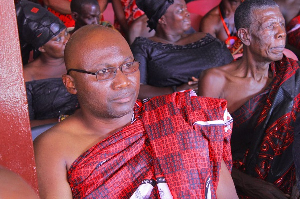Opinions of Tuesday, 15 November 2011
Columnist: Tsikata, Prosper Yao
The Tragedies of African Democracies – XIX
The nexus between migration and remittance from aboard
“Sink the boats carrying illegal-immigrants – BNP Leader! The DREAM ACT failed to pass, but our hope remains remittance from abroad.”
Brain drain and other forms of migratory-related issues are undoubtedly among the most charged and contentious issues of our time. The debates surrounding the topic have never been devoid of individual sympathies, ideological leanings, and political positions. Even research findings, depending on set of measurable factors or parameters, have never been congruent in estimating the cost and benefits to both losing countries and recipient countries.
It is in this complex debate that researches meant to elucidate the subject matter need to capture all key aspects of the phenomenon - in a holistic manner - rather than adopting strict quantitative models of analysis, assuming everything must be proved by how much immigrants send home each year. But, rather unfortunately, the debate has always been angled between poverty and remittance, brain drain and brain gain, among other factors, to the neglect of the wider qualitative human experiences, trends, political and ideological issues which are fundamental to the analysis of brain drain and other migratory-related issues.
To ignore the extent to which interactions at all levels of these remittance generating processes: qualitative processes, political debates in both recipient countries and countries of origin, ideological inclinations of governments, and individual sympathies - which permeates the economic results, is to tilt the debate without due consideration for the aforementioned dynamics, as the discourse on immigration, in most cases, have been.
The realities of the migratory trend, which I seek to construct, are completely dichotomous. Any keen observer of migratory trends, characteristic of the Ghanaian and for that matter the African situation, will concur that there are two important contradictory dimensions to the trend: both in its elite and mass characteristics.
Through a comparison of the ease of travel and visa acquisitions for the highly skilled, we may learn about the choices and the alternatives opened to the unskilled. Indeed, with over 50% of the highly skilled Ghanaians working in the Organization for Economic Cooperation and Development (OECD) countries - especially Britain, America, and Canada - it is clear that travel restrictions for the highly skilled are dispensed for the benefits these countries derive from the skills of these migrant workers. Besides, the migration decisions of the educated people looked very like the portfolio decisions that determine where wealth is held, and not much at all like the migration decisions of the uneducated, who are more likely to migrate the wider the differential between their earnings at home and what they can earn abroad.
Comparatively, the unskilled - who may be perceived to be of little value to recipient countries - are filtered. The result is that since their de rigueur contributions are in the corporate investments, which trained the highly skilled - who have migrated with far-reaching implications for social services at home - the unskilled, as a result of limited opportunities and non-functional social services, take to the desert and other unapproved means to escape the dysfunctions that have crippled social services and lack of opportunities for self-development back home. According to estimates by the BBC, over 3000 Africans from Sub-Saharan Africa perished in an attempt to cross the Sahara desert and the Mediterranean Sea to Europe in 2006 alone.
In 1992, seven Ghanaian stowaways and a Cameroonian on aboard a foreign vessel destined for Europe – Hamburg, Germany, specifically - were crudely hacked with axe, shot and dumped into the high seas. The sole survivor who, by a favorable set of circumstances and his own ingenuity, went through hell, survived to tell his horrendous story to a shocked world. Ghana’s former president, Jerry John Rawlings, is said to have come to the rescue of others who were dumped in the high seas a few times during his presidency. These incidents have become daily occurrences in the West and other Asian destinations that no eyebrows are raised these days when they occur – the response these days is “it is one of those recalcitrant Africans!” I saw it in Hull in 2005 when the lifeless bodies of two young Ghanaians were pulled from the bowels of a vessel ferrying cocoa beans from Ghana to the Port of Hull. The third emaciated survivor was hauled before court as soon as he recovered from the horrendous voyage that had brought him face-to-face with death.
Some of these stories might look exaggerated, but having met some of these individuals caught up in its trap in my travels, listened to their stories, and witnessed some of the outcomes of what might seem like foolhardy adventures, the most bizarre of these stories are human experiences - the realities of the human existence.
But the remittance argument has so much dominated the debate surrounding brain drain and its related migration stories so much so that the truth about the phenomenon is never captured. In 2010, Ghana’s central bank reported that between January and May 2010, US$4.2 billion of private money was remitted to Ghana, representing an increase of 22.2% over the same period the previous year. Similar revelations were made by Ghana’s foreign minister. Again, with the emphasis that it has helped in the reduction of poverty while empowering the citizenry economically. It is believed that this amount has even outstripped Foreign Direct Investment (FDI) and Development Assistance (DA) put together. The World Bank in its Annual Global Economic Prospects (GEP) report for 2006 noted that “with the number of migrants worldwide now reaching 200 million, their productivity and earnings are powerful forces for poverty reduction.” That is akin to a recent report by the IMF indicating the doubling of global remittance to the tune of US$336 billion to poor countries as a result of rising migration. Accompany this announcement in Ghana has been the indication that African policymakers are creating incentives to make private money transfer desirable to attract more remittances.
Politicians and policy-makers should heed the words of Soyinka on desertion. They should wean themselves to be weaned away from their shameful sophistry and failed policies. “if our hands were once laid in relay or in tandem upon the tiller, and your hands falter, weakens, or drops of finally, and you leap off the craft to the safety of the shore, do not invite the rest to abandon ship, whether doomed to sink or capable of salvage, and most definitely do not add an attempt to glorify desertion by dishonoring the resolve of the rest with the accident of their birth.”
Instead of efforts to reverse the trends and create opportunities for young Ghanaian men and women, and for that matter Africans, to work and create wealth in their own countries, these failures have now been accepted by policymakers who believed remittance from abroad is the way to go. With this understanding, obviously, efforts to dissuade individuals from abandoning their post or abandoning ship, (especially people in the medical profession), stowing away and traversing the desert to reach European shores and other destinations are doubly defeated, as the phenomenon is made attractive to the unsuspecting public.
I feel the pain of the immigrant everyday! I see his unceasing tears and they remind me of my own pains and tears. If these failures are the new policy to glorify our failures, nothing restraints the policy-maker and the politician himself to join the bandwagon to go and work in London, Paris, and New York, so our remittance can increase in multifold.
These failures illustrate the systemic policy failures on the part of the African politician and policy maker and an indictment on his solution finding abilities. Failure to capture the negative aspects of the phenomenon is a clear indictment on the African politician, implying that the process or the people who generate these remittances are less important than the remittance they generate.
This is similar to a story which is still told today along the lagoons of the Republic of Benin and comparable to it. According to Manning Patrick, the inhabitants along the lagoons of Benin believe that cowries were obtained by the use of slaves. “A slave was thrown into the sea and allowed to drown. The cowries would grow on the body of the slave, and after a time the body would be dredged up and the cowries collected from it.”
He intimated that the story is both true and untrue: ‘Cowry shells, of course, were money in Africa. The story is untrue in that cowries grow in the Indian ocean, not in the Atlantic or the lagoons edging it, and untrue in that slaves were not drowned in order to get them. But the story is true as well as picturesque in its presentation of the sacrifice made in order to gain money in exchange. It is a stark example of ideology justifying slavery in Africa. Africans seem to throw away a precious resource, young men and women, in exchange for money-for cash, in his estimation.
Further to this, the political discourses in recipient countries do not suggest that immigration is a trouble-free or straightforward issue. In the United States, Britain, wider Europe, and Asian emerging economies, immigration and its related issues have become key political issues with far-reaching political implications for politicians and immigrants alike. The result is that immigration and its cognate words have become completely threadbare and have assumed very negative nuances in destination countries in recent times. The words arouse trepidation, angst, and lost of nerve among immigrants, whilst whipping up animosity, xenophobia and the toughening of unwelcoming attitudes in local/recipient communities towards immigrants. This, in fact, complicates the integration processes in recipient countries. Understanding these processes therefore requires the full attention of researchers, observers and the state in their bid to capture the issue of immigration in its totality. Abstracting remittance from the social, political and economic interactions cannot be an effective analytical substitute for any holistic approach to a study on the subject. It leaves too many questions unanswered.
The current political debates are in sharp contrast with the rosy pictures painted by remittance from abroad advocates, which explicitly or implicitly baits potential or prospective migrants. For example, while the British government has almost completely overhauled the way economic migrants are admitted to Britain to make settlement options nearly impossible for immigrants, and also make it difficult for them to bring their dependents, the leader of the British National Party is on record to have suggested the sinking of boats carrying illegal immigrants; in both cases it is clear that migration-related issues have reached their boiling points. In 2006, the Conservative Party in Britain even threatened to withdraw from the UN Conventions on Refugees and Elements of European Human Rights Law. Obviously, this sends a signal to the world that Britain no longer tolerates those who abuse her immigration system under the guise of seeking political refuge or asylum. And today, the Conservative Party in Britain is ready to offer financial packages to individuals living in Britain illegally to return to their countries of origin. Spain and Italy have both tried this measure of rewarding illegal immigrants financially to return to their places of origin. Clearly with all these tough talks on immigration, the result is the straining of community relations and making local communities very hostile toward immigrants.
Keep tuned in…
The above-title is serialized into 30 articles covering issues of politics, corruption, education, migration, the economy (Ghanaian economy), unemployment, land tenure, dearth of policy innovation, and stories from the frontlines – Cote d’Ivoire, Kenya, ECOWAS and the AU. The series are syndicated and media houses/outlets interested in enriching the national debates in Ghana for the 2012 are free to publish all the series.
By: Prosper Yao Tsikata
Email: pytsikata@yahoo.com
Blog: http://theafricanmessenger.blogspot.com












